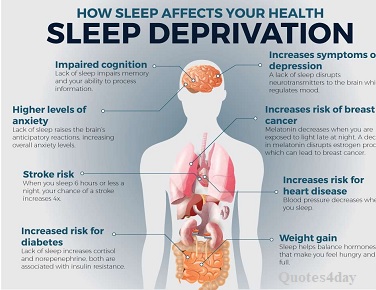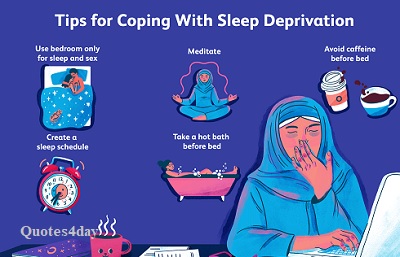[ad_1]
Did you get enough sleep? Approximately 50% of the respondents would answer “No”! Every day a person is faced with various stresses that negatively affect sleep. Perhaps everyone has experienced a lack of sleep and insomnia, we figure out how to establish a regimen and sleep soundly.

The impact of poor sleep on health
Bad sleep is not only its lack and absence. This is an insufficient quality of night rest and a discrepancy with natural rhythms.
People who sleep poorly:
- Irritable;
- Inattentive, with a slow reaction rate;
- Experience a constant feeling of fatigue;
- Do not absorb information in the required volumes.
This directly interferes with a normal lifestyle and affects the quality of work and leisure. The body reacts to lack of sleep by increasing blood pressure, heart rhythm disturbances, strong appetite, and even depression. And if you do not sleep for several days, paranoia and hallucinations begin.
Signs of sleep deprivation
Sleep deprivation is a situational or chronic lack of sleep.
Main features:
- Fatigue, irritability;
- Nervous disorders;
- Bad feeling;
- Drowsiness;
- Headache;
- Nausea;
- Decreased alertness, and inability to concentrate.
It is necessary to distinguish between ordinary and chronic sleep deprivation. The latter is very dangerous to health and leads to other sleep disorders.
Contrary to the myth, it is impossible to get enough sleep on the weekend for the whole week. Therefore, an adult needs to sleep from 6 to 8 hours a day – but this is also a conditional norm. Due to mutations in the genes, some people get fewer hours, while others have to sleep more. And that’s okay!
Causes of sleep deprivation
A person sleeps less than he needs for various reasons.
- Gadgets. The blue light of the screen at night “deceives” the body. Because of this, the natural desire to sleep disappears, and we go to bed later. In addition, the desire to sit longer on social networks read the news, or watch another series also steals precious hours of sleep.
- Caffeine. Caffeine dulls drowsiness but also lasts longer than the liquid is excreted from the body. If you drank a cup of strong drink at the end of the working day, then most likely you will lie down later.
- Stress. Due to strong emotions or troubles, you may not want to sleep. It is possible that in an excited state, you will fall asleep later and not get enough sleep. Or your sleep will not be a complete rest due to worries.
- Downed mode due to work, study, and daily activities. The mode seems to us an echo from school times, but the body likes stability. If you go to bed at a different time each day, you run the risk of simply not getting enough sleep.

If you do not have a regime at all, the body is working for wear and tear. Therefore, try to fix everything to avoid the appearance of chronic lack of sleep and insomnia.
Establishing a Healthy Sleep Pattern
- Rule of three T: silence, darkness, and temperature. It is in the dark that melatonin is produced, which regulates falling asleep and waking up. A comfortable temperature and comfortable bed will not distract you from falling asleep.
- And in the morning, on the contrary, it is better to wake up before dark, or at least turn on a bright light.
- Choose the optimal interval and duration of sleep. Roughly speaking, we sleep in cycles of 1.5 hours. It is easiest to wake up at the “junction” of the cycles when the deep sleep phase has not come. Another life hack is to wake up 2 hours after the lowest body temperature. For most people, this is 4-6 in the morning (respectively, you can get up at 6 or 8 o’clock).
- Do quiet activities before bed without loud music or bright lights. Try relaxation before bed: for example, drinking herbal tea, taking a relaxing bath, or getting a foot massage.
- Put your phone on silent, and turn off noisy electrical appliances. Harsh sounds at the time of falling asleep can “turn off” drowsiness or even cause insomnia.
- The bed is for sleeping only. Don’t eat in it, don’t work, and don’t lie around doing nothing. Otherwise, the body will lose the association of “bed-drowsiness-sleep”.
Signs of insomnia
Insomnia is a condition where a person cannot sleep, wakes up quickly after falling asleep, or wakes up too early.
Acute insomnia lasts up to 3 months, it happens periodically, and chronic is observed for 3 days a week or more than 3 months.
Main signs:
- Difficulty falling asleep;
- It is impossible to sleep after waking up (even a short one when you get up to use the toilet or drink water);
- Waking up too early in the morning.
Because of this, severe fatigue and other negative symptoms appear.
Causes of insomnia
- Stress and anxiety events.
- Changes in mode, environment, or work schedule.
- certain diseases.
- Taking medication.
- Bad habits associated with sleep (watching TV or scrolling the tape until late) and abuse of nicotine, alcohol, and drugs.
How to deal with insomnia
You can fight insomnia on your own until it becomes chronic. How to do it:
- Adjust sleep patterns (see tips above!).
- Avoid stress, and apply relaxation techniques.
- To refuse bad habits.
- Add moderate physical activity in the fresh air.
- Create a daily routine: wake up, eat, and go to bed at the same time.
- Lie down when you feel sleepy. Avoid short naps.
- Take mild sedatives such as chamomile tea or valerian.

Of course, all the conditions created will be useless if you still continue to regularly lack sleep.
Interesting on the topic Home Workout Tips to Reduce Stress and Anxiety
Chronic insomnia can only be cured by a doctor! Also, contact him if you can not cope with sleep disorders on your own, you may need to be examined.
Usually, sleeping pills and sedatives are prescribed for insomnia. The lightest of them is the same melatonin – it is also used when adapting to a new time zone. Other sleeping pills can be used only as directed by a doctor!
Fighting sleep deprivation is difficult because we are used to living in a busy rhythm. But without good and long sleep, no one can be productive. Therefore, adjust the sleep schedule so as not to face chronic insomnia or severe exhaustion.
FAQs
1. How long does it take to make a sleep routine?
It usually takes a few weeks to make a sleep routine. Everyone is different, so it may take some time to find what works best for you. Remember to be patient and keep trying!
2. Can exercise help with sleep problems?
Yes, exercise can help you sleep better. When you play or do sports during the day, it helps your body get tired, and you’ll feel more ready to sleep at night. Just remember not to exercise too close to bedtime as it might make you feel too awake.
3. Is it normal to wake up at night?
Yes, it’s normal to wake up for a short time during the night. Our bodies have different sleep stages, and sometimes we naturally wake up for a little bit. The important thing is to try to go back to sleep if you’re still tired.
4. What happens if we don’t get enough sleep for a long time?
Not getting enough sleep for a long time can affect our bodies and minds. It can make us feel tired all the time, have trouble paying attention, and make it harder to do well in school. It can also make us more likely to get sick.
5. Can some foods help us sleep better?
Yes, some foods can help us sleep better. Foods like turkey, almonds, bananas, and milk have things in them that can help us feel sleepy. Drinking herbal tea like chamomile or valerian root tea before bed might also help us relax and sleep better.
[ad_2]
Source link